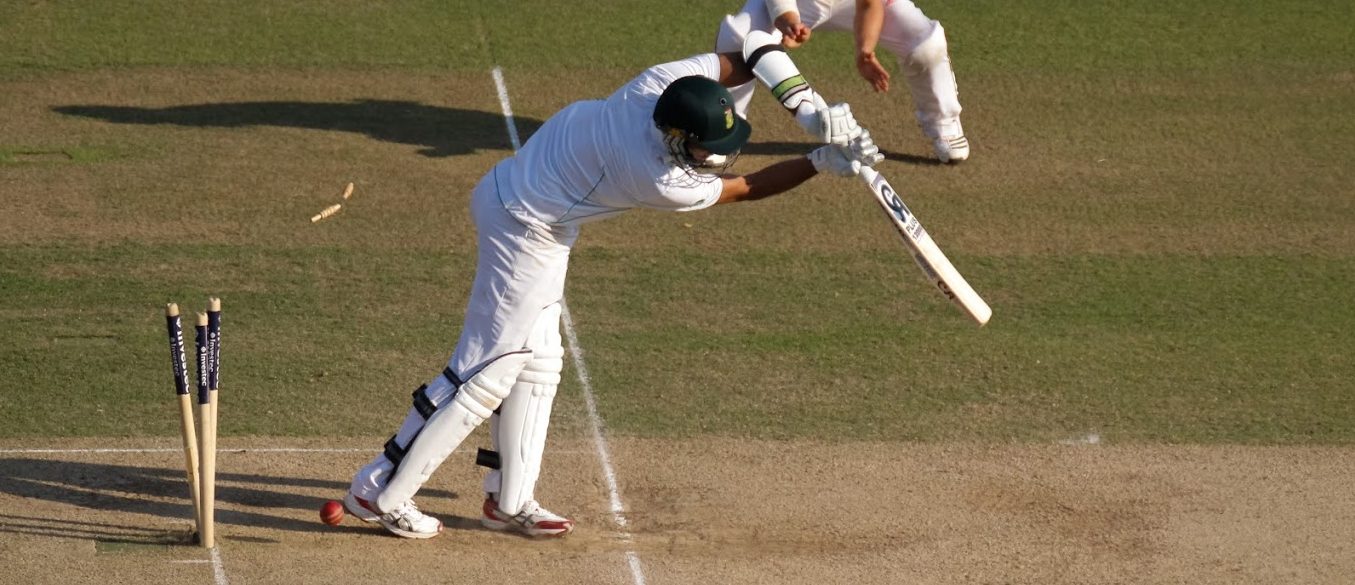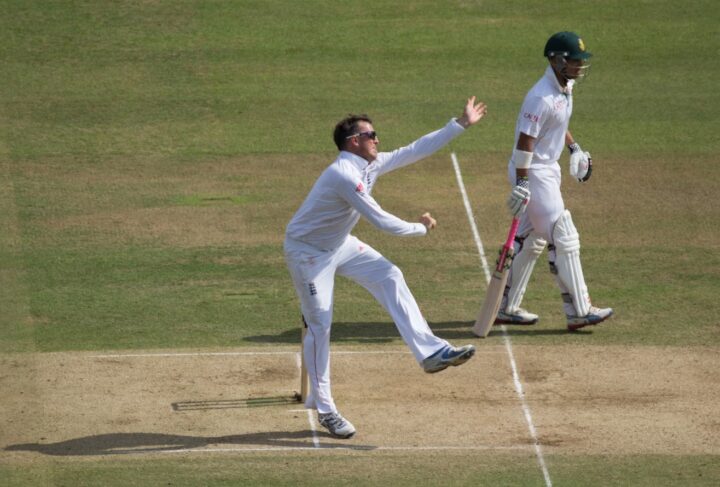Today new writer Srinivas S discusses a subject close to my heart. I’m sure all batsmen out there agree …
There one moment, gone the next
Few things in sport symbolise the fragility of life as batting does. There one moment, a batsman may be gone the very next, undone by a superb delivery or, just as often, by an error of judgement on his part or the umpire’s. Little surprise then that some of cricket’s finest batsmen often emphasise on the importance of the next ball. How a batsman deals with it determines at any given time the fate of his innings and, by extension, the longevity of his career.
Cricket today is widely regarded as a batsman’s game, but a batsman’s stint at the crease is a better metaphor for transience than a bowler’s spell. A bowler who has unflattering figures can still turn his day around by dismissing a couple of important batsmen from the opposition, or by just bowling a tidy spell at a crucial stage of the match. A batsman who has been dismissed, however, has to watch the game helplessly from beyond the boundary.
Moreover, it is not always the case that a batsman’s destiny rests in his own hands. For example, a batsman going out on a pair, looking to resurrect or establish a career, has to return to the pavilion without even facing a ball, if a bowler’s deflection of a straight drive onto the stumps finds him outside the non-striker’s crease. On another day, the ball may go for four, and he may go on to win the match for his team, and to have a storied career.

Things beyond a batsman’s control
A batsman may do everything right, but too much of his batting life depends on things that he cannot control. He may be facing a great bowler whose powers are on the wane, or a mediocre one who is in the middle of a once-in-a-lifetime-spell. He may be middling the ball gloriously on a summer’s day, or counting the number of edges on his bat on an overcast evening.
He may be the beneficiary of a rare dropped catch from a fielder who doesn’t drop many, or the victim of a blinder taken by poppadum fingers. He may be greeted by a belter of a wicket on the third day of a Test match, by a green top on the first morning of it, or by a minefield on the last afternoon. He may also see the umpire’s call going in his favour when he has already made a century, or against him when he has not yet crossed ten!
Then there are factors that he can control, but not quite fully all the time. How many times, for instance, has a batsman been dismissed because he turned his wrists on the ball a split second too late or too early? On how many occasions has eagerness forced a batsman to go too hard at a ball and inside-edge it onto his stumps?
Countless too are instances when a player in good form has driven a half-volley casually and, therefore, into the hands of a fielder in the thirty yards circle. Then, there is the tragicomedy of watching a fine player of the short ball pull one into the only pair of hands stationed on the legside boundary.
Batsman versus world
At best, a batsman’s stay at the crease has to do with the forces of fortune working in his favour. At worst, it has to do with the same forces arrayed against him. The effects of these forces may cancel each other out over a long career, but whether a batsman has one depends on the kinds of challenges he faces at various points of time and how he comes through them. This isn’t to say that talent, technique and toil do not count; they do, especially in preparing a batsman for the battle on the field.
Once there, however, he is all alone, not just against eleven men from the opposition, but also against the people vying for his place, so to speak, and the world which is ready to pronounce judgement at the drop of a hat. Every run he makes therefore is a triumph of resilience over the elements. Conversely, every dismissal he encounters represents the inevitable consumption of the individual by the vagaries of life.
– Srinivas S









Alternatively he can be a steroid-pumped (sorry, I mean a tribute to his hard-work in the gym) thrashing machine whose future depends entirely on his SR and for whom dismissal means very little except possibly missing out on some juicy franchise contract but never mind because there’ll be another meaningless match coming along shortly….
Oh you cynic! :-)
This article is all about first class / Test batting. “Thou shall not pass” type stuff.
I’m not sure where Geoff Miller being run out br Baptiste without facing a ball fits into this, but it ended his Test career ! Interesting article.
The fact that a certain Don Bradman, with more application than natural talent was able to average almost 100 per test innings, on uncovered wickets against all types of bowling indicated the human package is capable of narrowing the odds a good deal and there’s not a huge amount of luck involved.
Of course for us mere mortals who scratch away at weekends with our ups and downs bemoaning our luck it’s a different matter, but as in most sports, with obsessional application and a strong mindset you can almost guarantee success. It largely depends on what you’re prepared to sacrifice in life for it. Almost all top sportsmen and women start young and with the help and support of family stick at it. Of course it’s no guarentee and you have to have a certain amount of natural talent, but there’s no big secret to it. Even Ronnie O’Sullivan, probably the greatest example of natural talent produced on these shores practices obsessively after 25 years, in order to enjoy continued success at the game he loves. So much sport at the top level is mind over matter with the strong minded generally winning out.
Great article. As an ordinary club cricketer the view that it only takes one ball to get you out definitely made me a more defensive batsman than when I was younger. But then I ended up opening so the mindset usually went hand in hand. However it would come unstuck if both of the openers were of the same mindset!
Often in Sunday games I could drop down the order and be more aggressive or even defensive if the situation warranted it. There was less at stake in the Sunday friendlies too.
Probably the best contrast in batting attitudes came in one game where I opened with a young whipper snapper who wanted to smash everything. And he did. It was his day. When he got his hundred I was on thirteen!
One other point. Being aggressive however can put the fielding team on the defensive. Less slips, players further back etc. Reduces your chances of being out.
It’s a fine balance batting.
New head of the ICC already dancing on the grave of the WTC.
If it’s just about money, why is he at the same expanding women’s cricket? It’s about agendas.
I read those comments by Greg Barclay and grimaced. It really doesn’t sound good at all.
Why is the WTC so great though? Its main aim was to improve the popularity of tests by making sure they had “context”. It hasn’t (which is the point Barclay’s making)–many countries are still looking for any way they can to replace tests with one-dayers: look at the series which starts on Thursday, which was supposed to be three tests and no T20s, or the England-India series, which has been shortened largely to accommodate some non-league, context-free T20s.
That’s not surprising, because the context argument ignores the real issue, which is the cost of putting them on compared to the revenue they bring in. All the “context” in the world won’t change that.
Having a final for the WTC is a particularly dumb idea, especially this time where one team will have played 5 tests and another 21. Are you really “in context” the best team in the world if you get 450 points in the WTC while your rival gets 700, but you beat them once in a match which you play at home?
I won’t lament it–the FTP did anyway all the things that the WTC is supposed to do (and yes, countries occasionally cancelled/ignored series which were due to be played under the FTP, but they’re doing that under the WTC too: interesting how nobody’s rushing to reschedule their series against Bangladesh…)
The other thing here is this: it’s really easy to fling insults from the sidelines, but what would you actually do now to remedy the situation in relation to tests–and why would your suggestions work? I’d love to see the balance re-tilted in favour of tests but I can’t see how that’s going to happen, particularly outside those involving the Big Three.
I was referring more to his comments on Test cricket in general not the WTC in particular. It just didn’t sound like he’s keen on the format at all. He basically said “I’m a purist BUT ….” and then proceeded to say nothing positive about 5-day cricket at all.